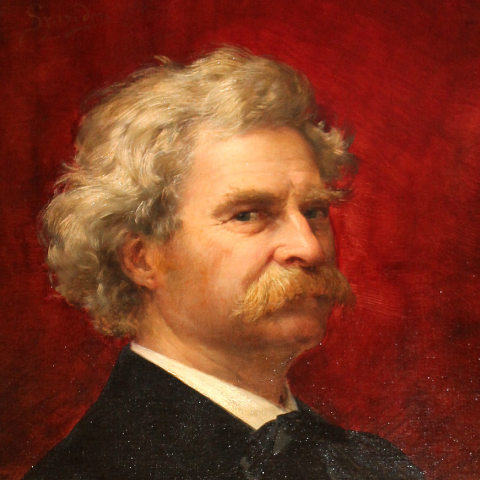Mark Twain Had an IQ of 170
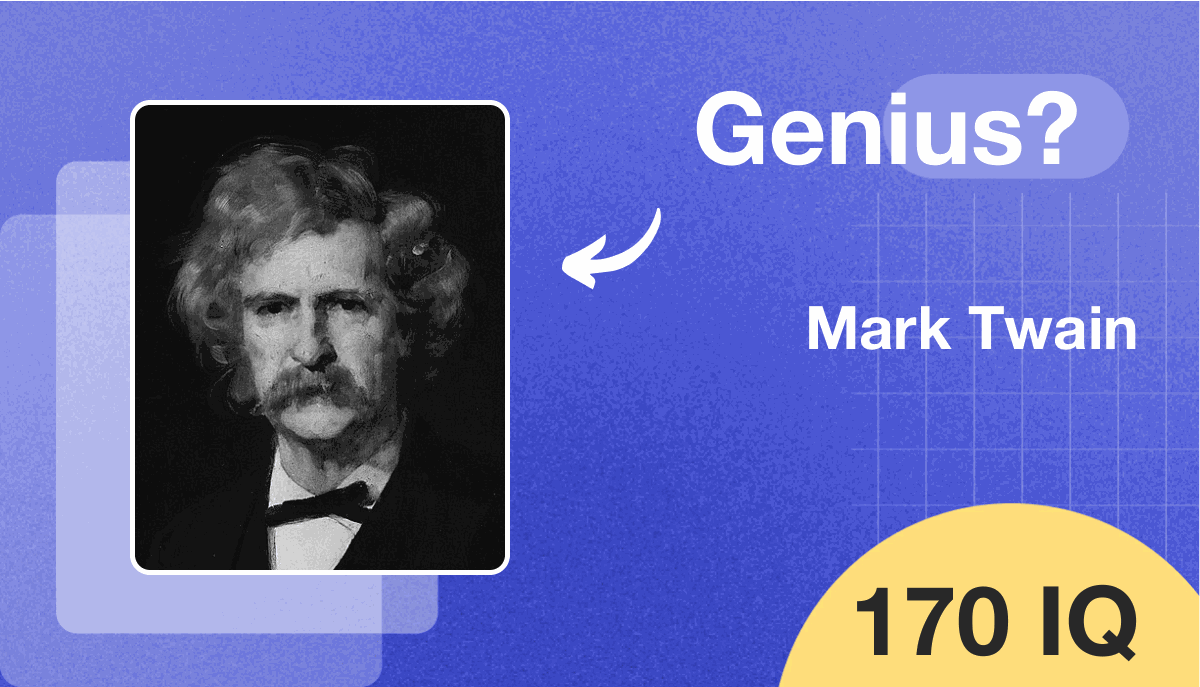
Samuel Langhorne Clemens, better known as Mark Twain, was a man whose mind ebbed and surged like the mighty Mississippi River he immortalized in his writings. Born in 1835 in the backwater town of Florida, Missouri, Mark Twain grew into America’s humorist laureate and its most biting social critic. But beneath the twinkle of his wit lay a mind of extraordinary acuity, often estimated – though never formally tested, see below – to align with an IQ of 170. Mark Twain’s genius, however, didn’t reside in raw intellect alone. It lived in his ability to distill complex truths into sparkling clarity, offering insights that resonate to this day.
“Consider the average intelligence of the common man,” he once quipped, “then realize 50% are even stupider.” This observation is classic Twain: humor wrapped around a profound critique of human folly. But Twain’s brilliance extended far beyond his one-liners. It shaped the American literary canon, redefined satire, and carved out truths about morality and power that still challenge and inspire.
A mind that saw beyond its time
Mark Twain was a man ahead of his era. His genius showed early, as he voraciously consumed knowledge beyond the limits of formal schooling. His education came from the streets, rivers, and books he devoured as a printer’s apprentice and later as a steamboat pilot. Twain’s experiences navigating the Mississippi were more than fodder for his stories – they were metaphors for the currents of human existence he would explore in The Adventures of Huckleberry Finn, a novel Hemingway claimed birthed all modern American literature. But Twain was not content to rest on literary laurels. His writings, from A Connecticut Yankee in King Arthur’s Court to his sharp anti-imperialist essays, displayed an intellect unafraid to challenge the status quo. While his contemporaries were dazzled by the Gilded Age’s glittering façade, Twain’s sharp mind dissected its hypocrisy and greed, coining the term “Gilded Age” to mock America’s superficial prosperity.Mark Twain’s wit, often mistaken for mere humor, was a weapon against societal absurdities. Raised in a slaveholding community, he initially absorbed the racist attitudes of the pre-Civil War South. However, exposure to the lives of enslaved people and his own moral awakening transformed him as reported by Cambridge University research. Twain’s works, from A True Story to Adventures of Huckleberry Finn, challenged racial superiority and slavery, with Huck’s recognition of Jim’s humanity mirroring Twain’s own evolution. Beyond writing, he funded Black education and supported leaders like Frederick Douglass, embodying a commitment to racial justice in both his life and art.
The relentless pursuit of wisdom
Twain’s genius extended beyond literature. He was a voracious thinker who dabbled in science, invested in groundbreaking (and sometimes ruinous) technologies, and questioned deeply held assumptions about religion, morality, and politics. He was, in many ways, the embodiment of intellectual humility – a man who constantly reevaluated his beliefs in light of new evidence or experiences.This relentless self-interrogation wasn’t always popular. Twain’s skepticism of organized religion and his sharp critiques of patriotism alienated many in his time. “Patriotism,” he said, “is supporting your country all the time, and your government when it deserves it.” Such insights, bold and uncomfortable, show a mind unafraid of complexity.
Twain also understood that true intelligence often lies in recognizing one’s own ignorance. His reflections predate modern psychological concepts like the Dunning-Kruger effect, which shows that the least competent are often the most overconfident. Twain’s advice to avoid stupidity rather than chase brilliance remains as relevant today as when he first delivered it, dressed in his signature white suit, captivating audiences across continents.
A legacy of brilliance and compassion
Mark Twain’s life was filled with contradictions – a skeptic who loved humanity, a man of humor who grappled with despair, and a satirist who wrote with a moral purpose. But through it all, his towering intellect illuminated paths of understanding and self-awareness. Whether skewering the pretensions of the powerful or navigating the depths of his own conscience, Twain’s legacy reminds us that intelligence is not just a gift but a responsibility.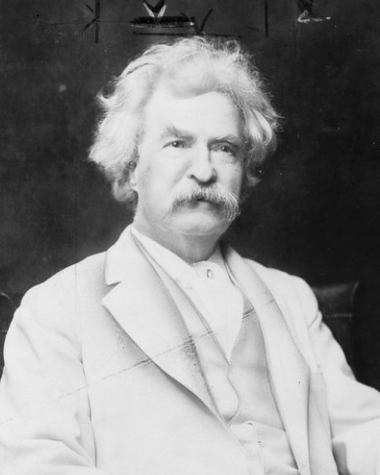

Average Confidence Level
LowWe averaged the IQ scores from two sources to estimate Mark Twain's IQ, namely Past Factory and Geni.
 Confidence Level: Low
Confidence Level: Low
 Confidence Level: Low
Confidence Level: Low
5 Facts That Show Mark Twain's Genius IQ
- High IQ Estimate: Mark Twain's intellect is underscored by an estimated IQ of 170. He belongs among the most brilliant minds, known for his deep understanding and observational skills.
- Innovative Writing Style: Twain revolutionized American literature with his unique narrative techniques and command of vernacular speech. These skills enriched his storytelling with realism and humor.
- Master of Satire: With keen observation, Twain used satire as a powerful tool to critique societal norms and injustices. This showcases his intelligent and insightful approach to issues.
- Global Speaker: Twain's intelligence and wit were also evident in his esteemed career as a speaker. He captivated audiences worldwide with his lectures and storytelling.
- Multiple Inventions: Demonstrating his inventiveness, Twain held several patents, including a self-pasting scrapbook, which became quite popular, further highlighting his creative genius.
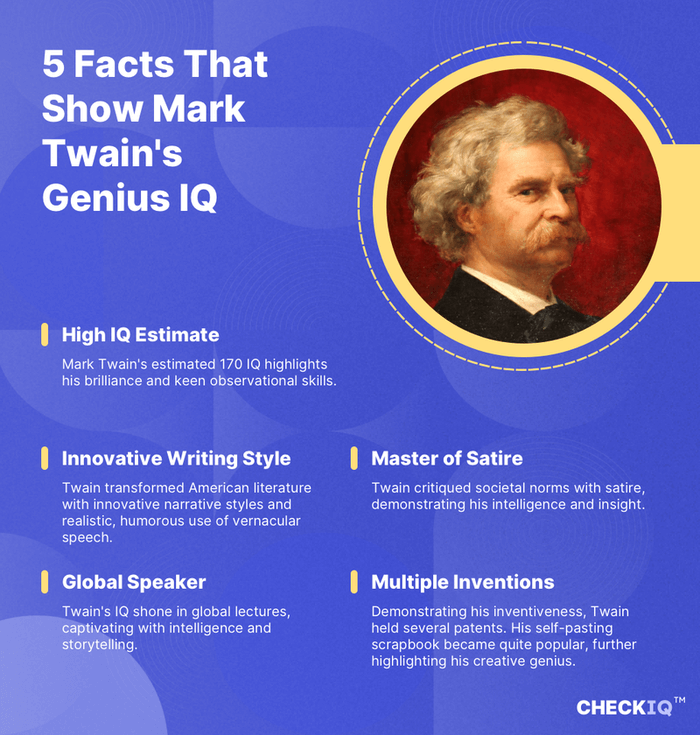
Try our accurate online IQ Test. Get your IQ score immediately.
Start IQ Test
How High Was Mark Twain's IQ Compared to the Rest of the World?
Mark Twain's IQ of 170 places him in an exceptionally elite bracket of intelligence, achieved by only one in half a million people. As a thought experiment, this level of brilliance would have easily granted him entry into Mensa, the well-known high-IQ society that admits individuals within the top 2% of the population. Furthermore, he would have qualified for even more exclusive groups, such as the Triple Nine Society and the Epimetheus Society, which require IQs in the top 0.1% and 0.003%, respectively.
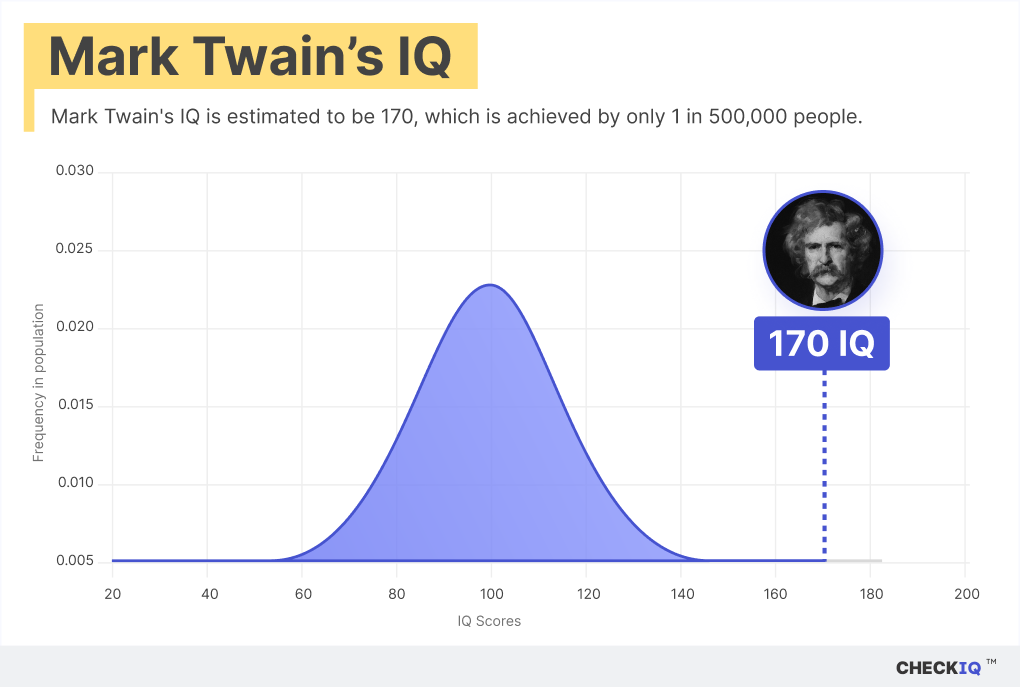
How Mark Twain's IQ Stacks Up Against Other Writers & Philosophers
His sharp wit and incisive critique of societal norms bear a striking resemblance to the literary innovation of William Shakespeare, whose IQ of 210 redefined English literature. Shakespeare’s ability to weave human complexity into every line revolutionized storytelling, just as Twain captured the contradictions of America’s post-Civil War era with humor and precision. Both writers left legacies that continue to resonate because of their profound insights into human nature.
Twain’s intellect finds a similar parallel in Johann Wolfgang von Goethe, whose IQ of 205 marked him as an unmissable figure in literature and philosophy. Goethe’s fusion of scientific curiosity with poetic depth transformed German intellectual traditions, much like Twain’s layered storytelling elevated American literature. Twain and Goethe shared an ability to connect diverse disciplines, weaving humor and humanity into their works, challenging societal norms while entertaining their readers.
Among his contemporaries in satire, Twain’s genius aligns with Voltaire, who had an IQ of 186. Voltaire, the French master of wit, used his pen to critique the absurdities of his society, a strategy Twain employed with equal mastery. While Voltaire questioned monarchy and organized religion in Enlightenment, Twain turned his gaze to the hypocrisies of slavery and class in postbellum America. Their shared ability to disarm with humor while striking at the heart of serious issues ties them together as intellectual allies across centuries.
In a different vein, Emanuel Swedenborg, with an IQ of 187, combined spirituality and science to produce a body of work that defied categorization. While Swedenborg ventured into metaphysics, Twain rooted his exploration in the physical and moral landscapes of the American South. Both men, however, were deeply curious about the human condition, seeking to understand and explain the world through their unique lenses.
Even with a lower IQ, Charles Dickens, at 145, shared Twain’s passion for exposing social injustices. Dickens used his storytelling to champion the downtrodden in Victorian England, creating unforgettable characters and narratives that forced readers to confront inequality. Similarly, Twain's works like Adventures of Huckleberry Finn dismantled the moral blindness of slavery, showing the transformative power of empathy.

Did you expect Mark Twain's IQ to be 170? Let us know in the comments section below!

Discover the IQ of Other Celebrities
-
 Magnus Carlsen190 IQ
Magnus Carlsen190 IQ -
 Scott Greer187 IQ
Scott Greer187 IQ -
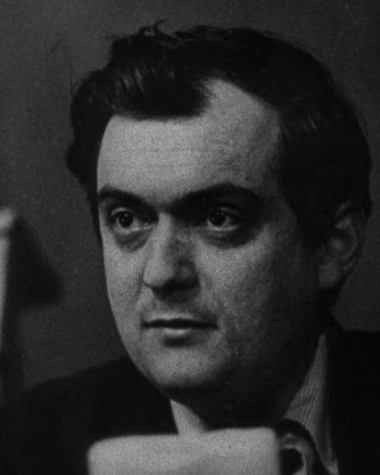 Stanley Kubrick187 IQ
Stanley Kubrick187 IQ -
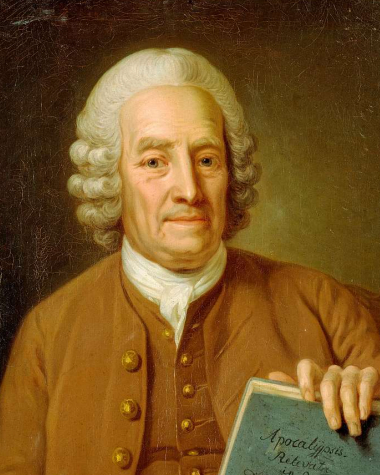 Emanuel Swedenborg187 IQ
Emanuel Swedenborg187 IQ -
 Josh Dobbs135 IQ
Josh Dobbs135 IQ -
 Christopher Michael Langan200 IQ
Christopher Michael Langan200 IQ

